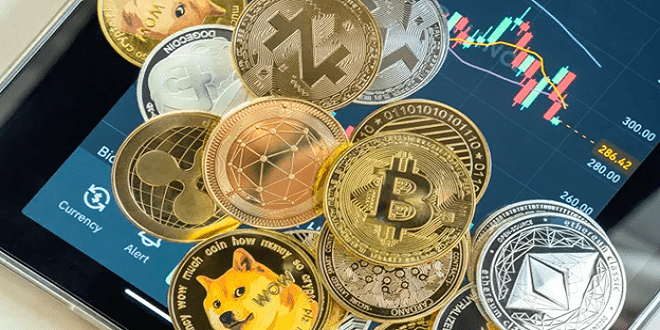In this material, we will break down the popular ways to buy cryptocurrency for fiat in 2023. But before we get started – let’s briefly go over the fundamentals:
Blockchain
The blockchain is a ledger that records all transactions involving cryptocurrencies. It operates on a network of computers ensuring that no single entity has control, over the network. The information within the network is replicated across all participants making it transparent and accessible to everyone. Once a transaction is recorded on the blockchain it becomes unchangeable.
Cryptocurrency Transactions and Private Keys
In cryptocurrency transactions coins are sent from one party to another. These transactions are secured using cryptography with private keys playing a role in ensuring their safety. Private keys are codes known to the sender used to authorize transactions. The receiver also possesses their key enabling them to access and use the received coins.
Cryptocurrency Wallets
Cryptocurrency wallets are tools used for storing and managing cryptocurrencies. They come in forms such, as hardware wallets, software wallets and paper wallets. Each type offers levels of security based on preferences.
To buy cryptocurrency you’ll need to set up a cryptocurrency wallet that’s compatible, with the type of cryptocurrency you want to purchase.
On-ramp and off-ramp in cryptocurrency trading
On ramps refer to the platforms where you can buy cryptocurrencies using fiat money while off ramps are the platforms where you can sell cryptocurrencies and receive fiat money in return. These terms are commonly used to describe cryptocurrency exchange services.
Cryptocurrency Exchanges
Centralized Exchanges (CEXs)
These digital platforms function similarly to stock exchanges, where users can buy, sell and trade cryptocurrencies in a manner. CEXs are managed by single entities and users create accounts, deposit either cryptocurrencies or fiat money, place orders and execute trades. They offer trading pairs, user interfaces and advanced tools like margin trading. Additionally CEXs have trading volume and liquidity levels, which means users have access to a wide range of cryptocurrencies. Trades on CEXs go through a matching engine system and fees are charged for each transaction based on a percentage.
Decentralized Exchanges (DEXs) Simplified
Decentralized exchanges (DEXs) are platforms built on technology that enable users to trade cryptocurrencies, with each other without the need for intermediaries. These DEXs offer enhanced privacy and security by eliminating middlemen although the availability of trading options may vary. There are two types of DEXs; automated market makers (AMMs) such as Uniswap and SushiSwap which utilize contracts and order book DEXs like 0x and Loopring that rely on order books. In order to use the service – users need to connect their wallets to these DEXs to create orders without any intermediaries involved. Unlike centralized exchanges (CEXs) , trades on DEXs are trustless as they rely on the transparency of the smart contracts.
Peer to peer (P2P) exchanges facilitate crypto trading between users – in P2P exchanges like LocalBitcoins and Paxful users negotiate prices and choose their payment methods to create orders without intermediaries. It’s worth noting that P2P exchanges carry a level of risk compared to DEXs since they rely heavily on trust between users. However these types of exchanges have gained popularity among individuals in regions where access to traditional banking systems is limited. In terms of decentralization P2P exchanges represent the approach to cryptocurrency trading.
DEXs can be viewed as an evolution of P2P exchanges due, to their increased decentralization and utilization of smart contracts. While peer, to peer (P2P) exchanges rely on trust between users, decentralized exchanges (DEXs) utilize technology and smart contracts to facilitate trades without the need for trust. DEXs can be seen as an stage in the evolution of cryptocurrency trading. However P2P exchanges still play a role in the cryptocurrency ecosystem in regions where access to traditional banking systems is limited. Despite their risks P2P exchanges offer users an peer to peer alternative to centralized exchanges.
OTC Desks – Where Significant Crypto Transactions Occur
Over the Counter (OTC) Desks are widely favored by high volume traders and institutional investors for conducting large scale cryptocurrency transactions. These desks provide trading experiences tailored to meet the needs of their clients. OTC desks are preferred over both centralized exchanges (CEXs) and decentralized exchanges (DEXs) as they offer a secure and private environment making them ideal for high net worth individuals and institutions. OTC brokers specialize in risk management and privacy solutions helping to mitigate slippage and counterparty risks. By vetting buyers and sellers and executing transactions within regulated frameworks OTC brokers instill confidence in traders regarding the integrity of their transactions.
In addition OTC desks provide a way to access liquidity, for trades while ensuring a discreet approach compared to public exchanges, which helps minimize any impact on the market. Overall OTC desks are a choice for securely, privately and efficiently executing cryptocurrency transactions.
Lesser-Known Crypto Acquisition Paths
Option 1 – Paper Cryptocurrency Wallet
A paper cryptocurrency wallet is a storage option that allows individuals to store their assets securely. It typically consists of a printed key in the form of a QR code. To actively manage their cryptocurrencies users can transfer them from the paper wallet to their wallets.
Option 2 – Cryptocurrency ATM
Cryptocurrency ATMs are kiosks where users can buy or sell assets using traditional payment methods or cash. To utilize a cryptocurrency ATM users must verify their identity choose the transaction type and desired cryptocurrency, input payment details and complete the payment process. When purchasing cryptocurrencies, at an ATM users will need a cryptocurrency wallet to receive the coins.
Crypto Gift Cards (Vouchers)
Crypto gift cards, which are also referred to as vouchers,’re prepaid slips that allow users to redeem an amount of cryptocurrency. These vouchers are sold by retailers and online platforms. Of providing a key they offer a receipt through a specialized online service.
After purchasing the voucher users need to activate it within a time frame. Once activated they can then redeem it for the chosen cryptocurrency. Different platforms offering gift cards provide a range of cryptocurrencies and purchase amounts.
Services that do not specialize in cryptocurrency
Using an, on ramp service like PayPal to buy cryptocurrencies has some considerations that users should keep in mind. These include the small selection of assets available, custodial wallet model used by such services and potentially high transaction fees.
However the convenience of buying cryptocurrency through these services has led to more and more people getting involved in assets.
In 2023 there are various options, for purchasing cryptocurrency each with its own unique features and benefits. While centralized exchanges offer usability, decentralized exchanges prioritize privacy and security. Over the counter desks cater to trades – providing personalized service while paper wallets offer a highly secure option for long term storage. Regardless of the chosen method it is crucial to adhere to security practices in order to protect ones assets. Given the changing nature of the cryptocurrency landscape staying informed and exercising caution are vital for a secure investment journey.
 Pagalmusiq.com Popular News Update Website | Pagalmusiq.com
Pagalmusiq.com Popular News Update Website | Pagalmusiq.com




